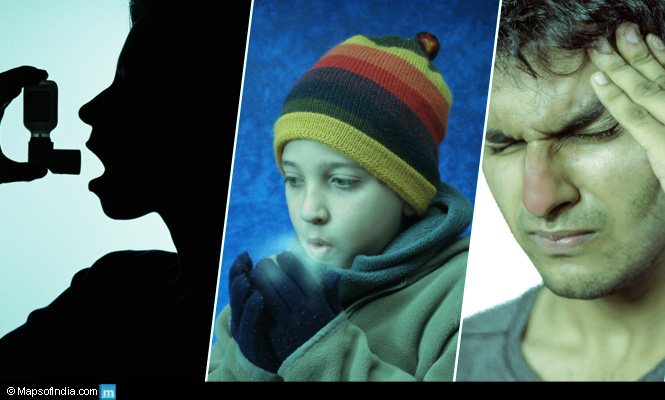 This winter, with the mercury plummeting to record levels, you need to watch out for some frequently occurring cold weather ailments. Here is a list of five conditions that could ruin your holiday season, and what you could do to reduce their effects.
This winter, with the mercury plummeting to record levels, you need to watch out for some frequently occurring cold weather ailments. Here is a list of five conditions that could ruin your holiday season, and what you could do to reduce their effects.
Problem 1
Common cold: With the change in weather, you can catch cold easily, especially if you happen to live with someone who already has the condition. This can usually progress to, or be accompanied by a sore throat, headache and body ache.
Solution: Keep warm and take rest. A simple paracetamol tablet may help alleviate most of the cold related symptoms. Drink plenty of fluids and wash your hands frequently to avoid passing on the infection to others around you.
Problem 2
Flu: You are more prone to influenza in the winter season. Children and elderly are particularly vulnerable to flu as well as pneumonia. In those who lack immunity, both flu and pneumonia could prove fatal.
Solution: For those in the extremes of age groups and for those whose immune status is poor, it may be a good idea to get flu vaccination just before the onset of winter. Once again, keeping warm and taking plenty of fluids should help if you have already got the flu.
Problem 3
Asthma: Allergic conditions such as asthma worsen during winters. Again, in the extremes of age groups, asthma could be debilitating and even fatal. If you are a smoker, chronic bronchitis may worsen during this season affecting your breathing and work productivity.
Solution: If you are asthmatic, do remember to take your blue and brown inhalers as directed by your doctor. It would be a good idea to carry them with you at all times. Avoid all those allergens that may trigger an attack in you, such as pollen and dust. Give up smoking.
Problem 4
Frost bite: In extreme cold conditions, especially if you have to work your way through snow, you may develop frost bite – a painful soft-tissue injury which occurs due to frozen extremities such as fingers and toes. Some people may develop Raynaud’s phenomenon, a bluish discoularation of fingers and toes, which occurs due to the occlusion of blood vessels in cold temperatures.
Solution: Wear protective clothing on your hands and feet. If necessary, use thermal undergarments to keep yourself warm when going out. This helps in keeping the blood flowing to the extremities. A simple hand rub may get the circulation going and keep your fingers warm. Take warm water baths during winters, and drink warm fluids.
Problem 5
Skin conditions: Winter itch occurs due to the dryness of skin, and allergic skin conditions such as eczema worsen in cold weather. If you already have psoriasis, it is likely to worsen in winters.
Solution: Moisturise the dry areas liberally during winters. Applying moisturising oils such as almond or olive oil after bath may help keep the moisture intact in the skin. If itching is severe, you may need an additional tablet for reducing it, for which it is better to contact the skin specialist. For those with psoriasis, continue the regular treatment and make sure you expose yourself to sunshine when you can and moisturise the affected areas. If psoriasis worsens badly, you may need ultraviolet light exposure, for which you may have to consult your skin specialist.




